#lm 2.8.8
Text
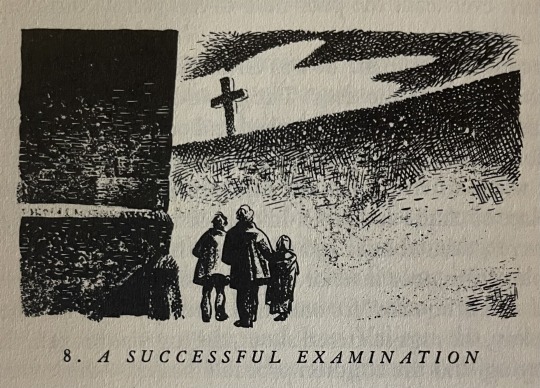
#my posts#les mis#les miserables#victor hugo#lascelles wraxall#wraxall translation#lynd ward#lm 2.8.8#fauchelevent#jean valjean#cosette
18 notes
·
View notes
Text
I love how we just casually learn that Fauchelevent became famous in the Vatican for this burial.
Starting with Cosette was so devastating, though. She may be a bit better because she’s spent time with Valjean rather than the Thénardiers, but how rapidly she reverts to “crisis” mode- where she shuts down and doesn’t speak - is horrifying. Her abuse is still recent, and with a stressful night (they’d just escaped Javert) and the threat of the Thénardiers, it’s no wonder she returns to the “lark” who doesn’t sing as a way of maintaining her safety. I wonder if these events are linked to why the prioress says she’ll grow up “ugly.” It could be a literal statement; the convent doesn’t prize beauty, so its pupils aren’t going to be made to look beautiful. It’s also praise in that she thinks that’ll push her to be a nun (”girls who are conscious of their beauty do not easily become nuns”). But it could also be a reminder that while Cosette was beautiful as a toddler (because Fantine gave her everything), years of deprivation and fear have taken away that beauty. Jean Valjean has helped her heal a bit, but it’s likely that she still doesn’t look well, especially after 24 tear-filled hours without food or sleep. And this was heartbreaking:
“ But when, at the expiration of these lugubrious twenty-four hours, she beheld Jean Valjean again, she gave vent to such a cry of joy, that any thoughtful person who had chanced to hear that cry, would have guessed that it issued from an abyss.”
I’m glad she’s with him again and that she felt so glad in that moment, but I wish that she hadn’t been deprived of that security for so long.
I was also interested in this ending passage:
“Nothing of this triumph reached Fauchelevent in his hut; he went on grafting, weeding, and covering up his melon beds, without in the least suspecting his excellences and his sanctity. Neither did he suspect his glory, any more than a Durham or Surrey bull whose portrait is published in the London Illustrated News, with this inscription: “Bull which carried off the prize at the Cattle Show.”“
It’s telling that even though Fauchelevent’s fame reaches the Pope, it doesn’t actually affect him. What does impact him is the reputation he gains with people closer to him: the convent trusts him more, Valjean appreciates his help and works with him, and Gribier is grateful as well. The Pope may be important, but Fauchelevent’s local impact is felt more by these people and by him. His ties with his community, then, take precedence over his fame, despite his community being nuns and the working class and his fame extending to the highest rank in Catholicism (of course, part of this is that no one in the convent is going to tell him this - he’s very isolated from outside information - but it also demonstrates how these local bonds can be more important than fame and status).
The comparison between Fauchelevent and a prize bull brings us back to the nuns’ image of him as a faithful laborer, as if he were a “farm animal” who simply obeyed their commands well rather than a person with his own schemes. Ironically, we know that he did what the nuns wanted in what would be, to them, the worst way possible: he did bury the coffin outside like they wished, but he also sheltered a man in the convent and used that coffin meant for a nun to help him legitimize his place there. Seeing him as a “prize bull” does recognize his value as a worker, but they’re able to imagine him like that because they underestimate his cleverness.
33 notes
·
View notes
Text
“Two men and a child presented themselves at No. 62 Rue Petit-Picpus” – what a nice modern family!
It's quite symbolic that Valjean does what he is best at: keeping silent and letting Fauchelevent do all the talking. I suppose that this was the secret of their success and the satisfaction of the vocal mother: "He answers well" - precisely because he "had not uttered a single word" - that's what was expected of him.
Now we know exactly how the stress of these two days took its toll on Cosette. She turned into a trembling, weeping, and completely mute creature. And it seems that the most stressful thing for her was not the prospect of her tormentor's return, but the prospect of her protector not coming back.
The prioress's comment on Cosette that "She will grow up ugly" sounds more like an assumption for the future than a statement of fact. All kids of a certain age are not particularly pretty, and Cosette is just about that age. Plus, she is stressed and exhausted, so her looks must not have been very promising. Anyway, we suspect that it's more about the prioress's wishful thinking.
22 notes
·
View notes
Photo

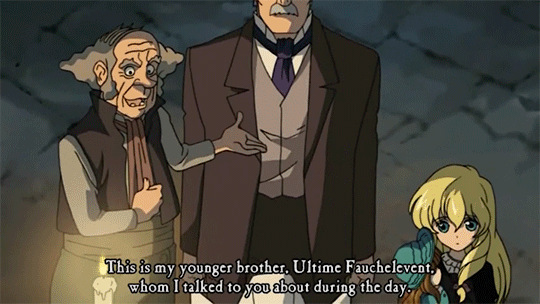
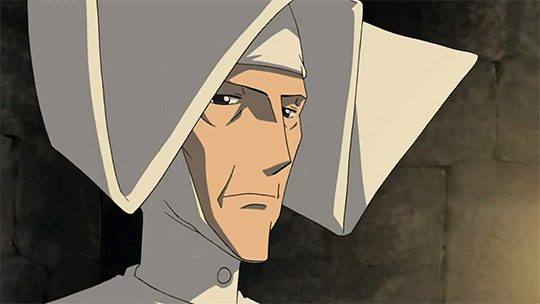
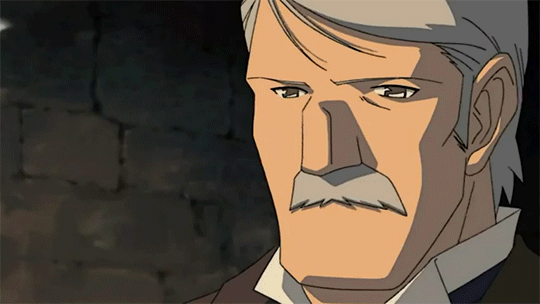
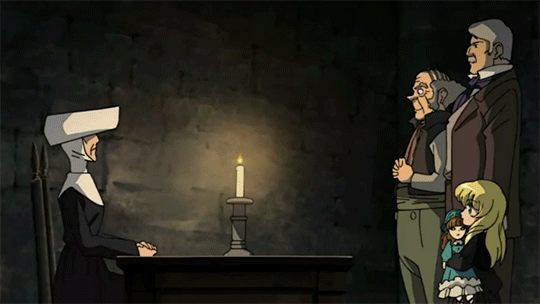

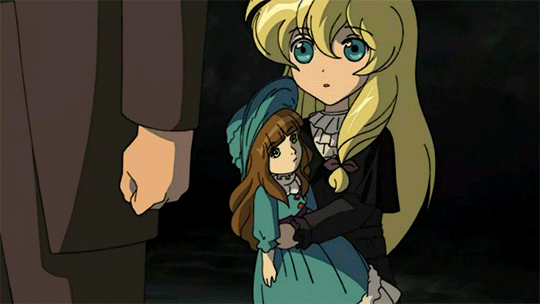
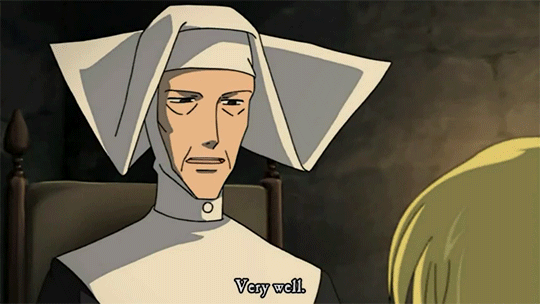
LES MIS LETTERS IN ADAPTATION - A Successful Interrogatory, LM 2.8.8 (Shoujo Cosette)
The prioress passed Jean Valjean in review. There is nothing which examines like a downcast eye.
Then she questioned him:—
“You are the brother?”
“Yes, reverend Mother,” replied Fauchelevent.
“What is your name?”
Fauchelevent replied:—
“Ultime Fauchelevent.”
He really had had a brother named Ultime, who was dead.
“Where do you come from?”
Fauchelevent replied:—
“From Picquigny, near Amiens.”
“What is your age?”
Fauchelevent replied:—
“Fifty.”
“What is your profession?”
Fauchelevent replied:—
“Gardener.”
“Are you a good Christian?”
Fauchelevent replied:—
“Every one is in the family.”
“Is this your little girl?”
Fauchelevent replied:—
“Yes, reverend Mother.”
“You are her father?”
Fauchelevent replied:—
“Her grandfather.”
The vocal mother said to the prioress in a low voice
“He answers well.”
Jean Valjean had not uttered a single word.
The prioress looked attentively at Cosette, and said half aloud to the vocal mother:—
“She will grow up ugly.”
The two mothers consulted for a few moments in very low tones in the corner of the parlor, then the prioress turned round and said:—
“Father Fauvent, you will get another knee-cap with a bell. Two will be required now.”
#Les Mis#Les Miserables#Les Mis Letters#les Mis Letters in Adaptation#Shoujo Cosette#valjean#Jean Valjean#Fauchelevent#Cosette#Cosette Fauchelevent#Mother Innocente#lesmisedit#lesmiserablesedit#shoujocosettedit#pureanonedits#LM 2.8.8
14 notes
·
View notes
Text
Brickclub 2.8.8 ‘The close‘
@fremedon is right. What IS going on with this chapter??
We’ve been saying all along, The Convent Is A Bad Idea, and this chapter seems to say, “Oh, yeah, the convent was great, actually! Exactly what Valjean needed! Good thing something appeared to humble him in time, he was starting to get Proud again, which leads back to hatred! Upside-down smile emoji!!!”
Which.. that really can’t possibly be the message.
Hugo says:
It cannot be denied that one of virtue's phases ends in pride. Therein is a bridge built by the Evil One.
And. Wait, sorry, does this book even BELIEVE in the devil? Is this free indirect speech? If so, whose?
Pride *is* often Valjean’s sin in a funny way. It’s the obverse of his excessive humility, and part of it, in a way that feels very human. He sacrifices too much, and that secret anger and resentment he doesn’t acknowledge tells him it’s too much. Then he becomes too proud of his excessive sacrifice and feels entitled to something--like Cosette--because of how much he’s suffered. He doesn’t know how to feel either anger or desire in a straightforward way, so he slingshots back and forth between excess of humility and excess of pride and grabs at what he really needs as he flies by.
And he WAS showing hubris a moment ago, when he was bending his habit for Christlike sacrifice and death and rebirth into somewhat unholy purposes.
But man. Crushing him further doesn’t escape that cycle, it IS that cycle.
When he was learning to parent Cosette and consciously experiencing love for the first time, that was new and good. That followed after the bagne, which had destroyed him all over again, and he needed that love even more desperately than she did.
The Gorbeau house looked foul and felt fair, and this looks fair and feels foul.
But, of course, it doesn’t to Valjean. Because it’s exactly constructed out of shapes of things he recognizes. It’s familiar punishment, like the bagne, but it’s holy, like the bishop. He recognizes in the nuns a holy sacrifice that he aspires to. It feels effortful to him the way growth feels effortful.
But the nuns are the wrong holy sacrifice. He could have come across the students and their rebellion instead, and I don’t know if he could have recognized it, but it feels so much closer to what he needed.
As Madeleine, he thought he could fix the world, and he discovered catastrophically that he was fixing it the wrong way. The belief in great men was hubris, and recognizing the cruel and broken system wasn’t--but he gave up both. The students’ anger at the system would feel dangerous to him, given how much anger must be inside him. But love for the world, and love that admits the possibility of anger, would be a far better direction of growth.
But he can’t see it. So he embalms his happy memories of those few good weeks parenting Cosette, and he humbles himself until he feels unworthy of being the father of a living child. He figures out exactly how much he needs to survive--a hole where Javert can’t find him, a garden, an hour of Cosette a day (he’ll try that last one again in a few years)--and he rations himself exactly that much and no more.
So he kneels before those who kneel before death, and he tries to teach himself to sacrifice more and sacrifice better so he doesn’t become so proud ever again.
He’s dead and benumbed enough after the burial that he finds it all very pleasant, actually.
16 notes
·
View notes
Text
Brickclub 2.8.8, “A Successful Interview,” and 2.8.9, “Cloistered”
I don’t really have anything to say about 2.8.8 that Bird didn’t say in his excellent writeup, so let’s move straight on to 2.8.9, “Cloistered.”
This is a long chapter and there’s just so much here. In the first sentence, we are told, “In the convent, Cosette continued to keep quiet.” She’s been trained to be quiet and small and had only just started to trust Valjean when he went away and left her again. But by the end of the chapter, Cosette is laughing, loudly enough and often enough for Valjean to pick out her laughter from the other girls’; and, “[t]hough still not pretty, Cosette, it must be said, was becoming delightful.”
Valjean came back for her. Her faith and trust were finally rewarded, and she gets to build on that. Cosette bounces back. Valjean… hoo boy.
He puts her mourning outfit aside in a suitcase full of camphor—which is to say, an embalming chemical. For Cosette, putting off mourning is a good thing. She starts laughing again. For Valjean—the clothing of a child that no longer fits (and mourning doesn’t fit beyond its term) was the first example given of the shades of the past making an invalid claim on the present. Cosette will dub the suitcase The Inseparable; Valjean will keep it always next to his bed with the key on his person—but his distance from Cosette herself starts growing, and will continue to grow.
When there are outside errands, the elder Fauchelevent runs them, and the nuns never notice that Valjean never leaves the convent cloister: “These four walls now constituted his world. Here, he saw enough of the sky for his own serenity and enough of Cosette to be happy.”
So, firstly, FOUR WALLS. As in FOUR, as in WALLS, and as in WAR BETWEEN—three levels on which this is not a good place and Valjean’s serenity and happiness do not mitigate that.
I do like the ambiguity of the nuns either being incapable of spying on Valjean, or too preoccupied with spying on each other to bother. It’s a nice transition into Valjean’s POV on the nuns, from the narrator’s.
And it’s a big shift. All through the heist sequence, the nuns have been really worldly—driven by ambition—right up through the end of 2.8.8 where they’re humblebragging about the heist in their confessions—and focused on worldly obstacles: public health regulations, bureaucracy, fines, and the physical challenges of moving and concealing a body. From Valjean’s POV, we don’t get any of that—he doesn’t perceive the reality and individualism of the nuns that Hugo has spent a very long digression building up. Some of his observations about the convent are probably true—I’ll come back to that—but he’s idealized it to a degree that Hugo has just spent a hundred pages telling us we shouldn’t.
Which, in conjunction with all the other things I’ve been noticing about the convent this time around, leaves me really not sure what to do with this:
God has his ways, after all. The convent contributed, like Cosette, to sustaining and completing in Jean Valjean the work of the bishop. It is certain that there is an aspect of virtue that leads to pride. There is a bridge there built by the devil. Jean Valjean was perhaps unwittingly quite close to that aspect and to that bridge when providence cast him into the Petit-Picpus convent. So long as he compared himself only with the bishop, he regarded himself as unworthy and remained humble, But for some time past he had been starting to compare himself with other men, and pride was germinating in him. Who knows? He might have ended up returning very slowly to hatred.
So, to start with. This is one of those paragraphs where there’s an awful lot that’s implied but not stated, and I am learning that Hugo is usually up to a lot of trickery when he does that. Parts of this paragraph make me want to read it as Hugo’s usual brand of irony or even sarcasm—that last line undercuts itself so many times I have a hard time reading it any other way.
And I have a very hard time seeing the pride Valjean has developed as a bad thing, or regarding himself as unworthy—a tendency that’s going to increase a hundredfold in the convent—as good. The constant repetition of fours and eights, Gothic death imagery, and all the comparisons to literal jails are driving home the ways that this is not a healthy place for Valjean.
But then there’s “sustaining and completing the work of the bishop.” There’s…definitely a reading to be made that the particular work of the bishop that’s being completed here is not Valjean’s salvation or his rescue from hate and despair, but the undermining of his sense of self-worth and righteous anger. I don’t know if that’s what we’re intended to take from this. I definitely think, this time through, that the bishop isn’t set up as perfect, that we are meant to critique his way of dealing with Valjean and the world—but tying him to this place and what it does to Valjean feels like a deeper acknowledgement of fault than I get the sense the book is ready to make.
After this comes the long, point-by-point comparison of the bagne and the convent, ending with
“And in these two places, so alike and so unalike, these two species of human being, so different from each other, were devoted to the same task: expiation.
Jean Valjean well understood the expiation of the former, personal expiation, expiation for oneself. But he did not understand that of the latter, that of these blameless creatures free from sin, and he wondered with a shudder: ‘Expiation of what? What expiation?’
A voice in his conscience replied: ’That most divine of human generosities, expiation for others.’
Here, all our own thinking is set aside. As narrator, we are simply putting ourselves in Jean Valjean’s position and conveying his impressions from his point of view.
Just as whenever Hugo insists that he’s digressing onto a completely irrelevant tangent, he’s making a central point, I’m pretty sure that right here he’s stressing that these are also the views of the book and of himself, Victor Hugo.
So we do get the bottom rungs of the ladder whose top is the barricade: another republic enclosed in four walls, expiating the sins of others, but doing it more effectively—a tollgate to the future. The nuns really are attempting a great good, even if everything about how they’re going about it is inside-out.
But Valjean is going to take exactly the wrong lessons from them:
Sometimes in the evening at twilight, a time when the garden was deserted, he could be seen kneeling in the middle of the path running alongside the chapel, in front of the window he had looked through on the night of his arrival, turned towards the spot where he knew the sister who was making reparation lay prostrate in prayer. And so he prayed, kneeling before the sister. It was as if he dared not kneel directly before God.
We’ve seen him kneel like this outside the bishop’s house; and we’ll see him prostrate himself in front of Cosette’s little mourning outfit. Throughout his life, we see him approach God through intermediaries because he feels unworthy of any other approach.
But I’m also feeling echoes here of Grantaire—someone else who recognizes the divine generosity of work that he doesn’t feel worthy or qualified to join in, and can only get as far as venerating the person doing the work.
Maybe that’s what we’re supposed to take from the promissory note from the Royal and Catholic army, pasted to the wall of Valjean’s room by an ex-Chouan gardener—a piece of scrip from the other side of the revolution, kept as a souvenir with no actual value, just as Grantaire will have an old assignat in a drawer.
4 notes
·
View notes